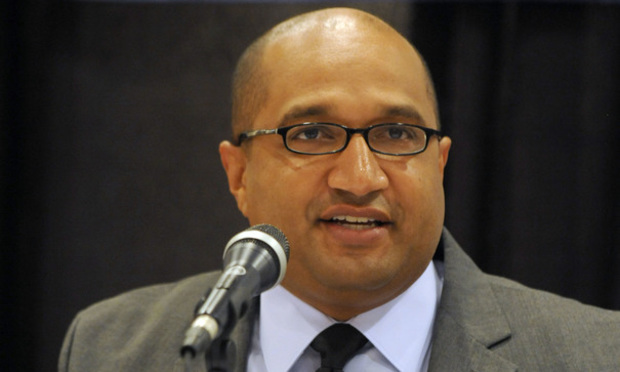NY DAs Ask Cuomo to Fund More Videotaped Interrogations, Body Cameras
“There is no doubt that the everyday work of prosecutors is an integral part of maintaining and improving the quality of life for all New Yorkers," DAASNY president David Soares said.
October 26, 2018 at 02:02 PM
6 minute read
 Albany DA David Soares. Photo Credit: Tim Roske
Albany DA David Soares. Photo Credit: Tim Roske
The state's district attorneys asked Gov. Andrew Cuomo in a new letter to include more funding in his executive budget proposal to provide continuing legal education for prosecutors, more body-worn cameras for police agencies statewide, and more money for counties to reimburse their salaries.
Albany County District Attorney David Soares, president of the District Attorneys Association of the State of New York, highlighted the state's lower crime rate over the past decade in a laundry list of requests sent to Cuomo this week.
“New York has the lowest crime rate of any large state. New York also has the lowest imprisonment rate of any large state. Since 2007 crime has declined by 18 percent in New York state,” Soares wrote. “There is no doubt that the everyday work of prosecutors is an integral part of maintaining and improving the quality of life for all New Yorkers.”
The snag, Soares said, is that many of the offices of district attorneys are underfunded and understaffed in New York. DAASNY asked Cuomo to put more money in the budget to support their priorities, of which there are many.
The group recommended that Cuomo include more funding for technology that police agencies and prosecutors would use to improve transparency both during an arrest and when an individual is in custody. That includes videotaped interrogations. DAASNY supports the practice, but it doesn't come cheap, Soares said in the letter.
“While embracing this technology, district attorneys are now experiencing first-hand the ongoing costs that come with using this technology, such as transcription, translation, photocopying, storage, presentation software for courtroom use, and equipment maintenance and replacement,” Soares wrote. “Investment in video recording of interrogations is money well spent; it directly contributes to a fair, strong and transparent criminal justice system.”
DAASNY recommended that Cuomo include $500,000 in additional funding for police departments to develop and maintain video recording locations. They also recommended another $500,000 be allocated to district attorneys to purchase equipment, arrange storage, transcribe the footage, and train staff, among other costs.
Many of the same costs are associated with purchasing and maintaining body-worn cameras at police agencies. Storage costs for the video can range from $100 to $1,000 every month, Soares said. The cameras themselves cost, on average, $1,000 per device, according to the letter. Many police agencies don't have the funds to support that kind of investment, which would be an ongoing cost, Soares said.
“Without significant state funding, once police begin routinely wearing recording devices district attorneys will have to deal with the ongoing costs that come with using this technology,” Soares wrote. “Obligations associated with these recordings include reviewing, redacting, transcribing, translating and disclosing thousands of hours of recordings.”
The group recommended that Cuomo include $1.5 million to equip police officers with body cameras and allow prosecutors to handle the footage. The latter cost has yet to be established, Soares said, so DAASNY recommended that Cuomo and state lawmakers revisit the funding each year to ensure the resources are there to support the technology.
Prosecutors also have to be trained on how to manage the technology, which is where the continuing legal education costs come in. DAASNY asked Cuomo to include $2.75 million in funding for the New York Prosecutors Training Institute, which would be an increase of more than $400,000 over last year.
The institute provides training to prosecutors on several topics, like ethics and technology, but it also offers a handful of services to district attorneys. It helps with research and drafting motions and appeals, for example, especially for counties with fewer than 10 assistant district attorneys, according to the letter.
“NYPTI spurs information sharing and collaboration among prosecutors, and between prosecutors and other criminal justice agencies in order to promote problem-solving—all while maximizing scarce resources,” Soares wrote.
Speaking of scarce resources, Soares also wrote that counties have been unable to pay some district attorneys their full salary after state law increased it earlier this year. Statute requires that a district attorney's salary match the County Court judge or Supreme Court judge in a county depending on the population of that county, Soares wrote. The salary of Supreme Court judges increased to $208,000 earlier this year after a state commission voted to raise it in 2015.
“Cash-strapped counties were reluctant to pay for that unfunded mandate,” Soares wrote. “As a result, not all district attorneys are being paid what the law requires them to be paid for their services and they are in a political quandary if they demand what is rightfully owed to them by statute.”
DAASNY recommended that Cuomo include an additional $2 million in his budget to cover the salary increase, which would bring the total funding reimbursement to counties for salaries to $6.2 million in the next fiscal year.
Soares also wrote about a number of other priorities for prosecutors over the next year. DAASNY recommended that Cuomo include more funding to combat gun violence, the opioid epidemic, Medicaid fraud, tax fraud and motor vehicle theft.
They also recommended continued funding for loan forgiveness programs for prosecutors and public defenders, as well as funding to recruit and retain prosecutors who already have experience and training.
Cuomo will deliver his executive budget proposal in January and negotiate with lawmakers on a final state budget until its due at the end of March. A spokesman for Cuomo did not immediately comment on DAASNY's letter Friday.
READ MORE:
DAs File Constitutional Challenge to NY Prosecutorial Conduct Commission
Cuomo, Lawmakers Agree on Changes to Prosecutorial Misconduct Commission Bill
DAs Plan Constitutional Challenge to Prosecutorial Misconduct Commission
This content has been archived. It is available through our partners, LexisNexis® and Bloomberg Law.
To view this content, please continue to their sites.
Not a Lexis Subscriber?
Subscribe Now
Not a Bloomberg Law Subscriber?
Subscribe Now
NOT FOR REPRINT
© 2025 ALM Global, LLC, All Rights Reserved. Request academic re-use from www.copyright.com. All other uses, submit a request to [email protected]. For more information visit Asset & Logo Licensing.
You Might Like
View All
Justice 'Weaponization Working Group' Will Examine Officials Who Investigated Trump, US AG Bondi Says

Lawyers Across Political Spectrum Launch Public Interest Team to Litigate Against Antisemitism
4 minute read
'Landmark' New York Commission Set to Study Overburdened, Under-Resourced Family Courts

Trending Stories
- 1New Charges Expected in Sex Trafficking Case Against Broker Brothers
- 2With AI, What Changes Can Midsize Firms Expect?
- 3Saul Ewing Loses Two Partners to Fox Rothschild, Marking Four Fla. Partner Exits in Last 13 Months
- 4Eagles or Chiefs? At These Law Firms, Super Bowl Sunday Gets Complicated
- 5Former NY City Hall Official Tied to Adams Corruption Probe to Plead Guilty
Who Got The Work
J. Brugh Lower of Gibbons has entered an appearance for industrial equipment supplier Devco Corporation in a pending trademark infringement lawsuit. The suit, accusing the defendant of selling knock-off Graco products, was filed Dec. 18 in New Jersey District Court by Rivkin Radler on behalf of Graco Inc. and Graco Minnesota. The case, assigned to U.S. District Judge Zahid N. Quraishi, is 3:24-cv-11294, Graco Inc. et al v. Devco Corporation.
Who Got The Work
Rebecca Maller-Stein and Kent A. Yalowitz of Arnold & Porter Kaye Scholer have entered their appearances for Hanaco Venture Capital and its executives, Lior Prosor and David Frankel, in a pending securities lawsuit. The action, filed on Dec. 24 in New York Southern District Court by Zell, Aron & Co. on behalf of Goldeneye Advisors, accuses the defendants of negligently and fraudulently managing the plaintiff's $1 million investment. The case, assigned to U.S. District Judge Vernon S. Broderick, is 1:24-cv-09918, Goldeneye Advisors, LLC v. Hanaco Venture Capital, Ltd. et al.
Who Got The Work
Attorneys from A&O Shearman has stepped in as defense counsel for Toronto-Dominion Bank and other defendants in a pending securities class action. The suit, filed Dec. 11 in New York Southern District Court by Bleichmar Fonti & Auld, accuses the defendants of concealing the bank's 'pervasive' deficiencies in regards to its compliance with the Bank Secrecy Act and the quality of its anti-money laundering controls. The case, assigned to U.S. District Judge Arun Subramanian, is 1:24-cv-09445, Gonzalez v. The Toronto-Dominion Bank et al.
Who Got The Work
Crown Castle International, a Pennsylvania company providing shared communications infrastructure, has turned to Luke D. Wolf of Gordon Rees Scully Mansukhani to fend off a pending breach-of-contract lawsuit. The court action, filed Nov. 25 in Michigan Eastern District Court by Hooper Hathaway PC on behalf of The Town Residences LLC, accuses Crown Castle of failing to transfer approximately $30,000 in utility payments from T-Mobile in breach of a roof-top lease and assignment agreement. The case, assigned to U.S. District Judge Susan K. Declercq, is 2:24-cv-13131, The Town Residences LLC v. T-Mobile US, Inc. et al.
Who Got The Work
Wilfred P. Coronato and Daniel M. Schwartz of McCarter & English have stepped in as defense counsel to Electrolux Home Products Inc. in a pending product liability lawsuit. The court action, filed Nov. 26 in New York Eastern District Court by Poulos Lopiccolo PC and Nagel Rice LLP on behalf of David Stern, alleges that the defendant's refrigerators’ drawers and shelving repeatedly break and fall apart within months after purchase. The case, assigned to U.S. District Judge Joan M. Azrack, is 2:24-cv-08204, Stern v. Electrolux Home Products, Inc.
Featured Firms
Law Offices of Gary Martin Hays & Associates, P.C.
(470) 294-1674
Law Offices of Mark E. Salomone
(857) 444-6468
Smith & Hassler
(713) 739-1250






